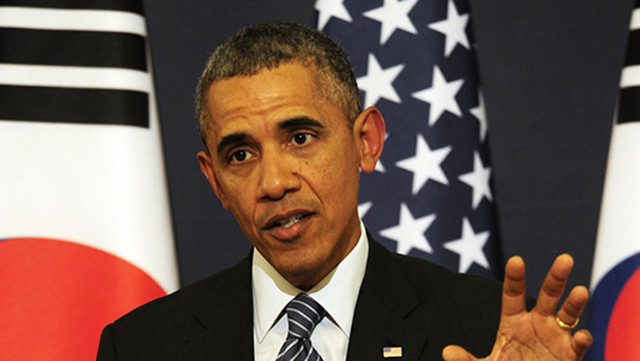SUMMARY
This is AI generated summarization, which may have errors. For context, always refer to the full article.

SEOUL, South Korea – The Japanese wartime system of sex slavery was a “terrible” violation of human rights and its victims need to be heard, US President Barack Obama said Friday, April 25, in Seoul.
Stepping into one of the most contentious issues in Northeast Asia, Obama said there needed to be an accounting of the wrongs perpetrated by Japanese Imperial troops before and during World War II when thousands of women were forced into prostitution.
“This was a terrible, egregious violation of human rights. Those women were violated in ways that even in the midst of war were shocking,” he said.
“And they deserve to be heard, they deserve to be respected. And there should be an accurate and clear account of what happened.
“I think (Japanese) Prime Minister (Shinzo) Abe recognizes this and certainly the Japanese people recognize that the past is something that has to be recognized honestly and fairly.”
Despite formal apologies issued by the Japanese government, South Korea and other nations accuse Tokyo of failing sufficiently to atone for the “comfort women” pressed to service its troops during its brutal war of expansion.
While many Japanese accept the country’s guilt, some senior politicians on the right – including Abe – have suggested that the issue is overblown, putting huge pressure on ties between Tokyo and Seoul.
Obama, who arrived in South Korea earlier Friday after a 3-day state visit to Japan, said the two nations must find a way to move on.
“It is in the interests of both Japan and the Korean people to look forwards as well as backwards and to find ways in which the heartache and the pain of the past can be resolved.”
A rising strain of nationalism in both countries over recent months has inflamed the row, with South Korean pressure groups in the United States erecting statues to former comfort women.
Washington finds it frustrating that its two major allies in the region are unable to resolve their issues and work together on other pressing issues, such as an increasingly strident China and Pyongyang’s nuclear weapons program.
Satellite photos taken just two days ago showed additional activity at North Korea’s Punggye-ri test site that is “probably related to preparations for a detonation,” the US-Korea Institute at Johns Hopkins University said.
The report echoed recent warnings from South Korea that the North might be planning a nuclear test to coincide with Obama’s two-day visit.
“As has been said before, the interests today of the Korean and Japanese people so clearly converge,” the US president said.
“You are both democracies; you both have thriving free markets; you both are cornerstones of a booming economic region. You both are strong allies and friends of the United States.
“My hope would be that we can honestly resolve some of these past tensions, but also keep an eye on the future.”
Japan reacts
Japan warned the issue of its wartime system of sex slavery was not a “diplomatic” subject.
Katsunobu Kato, deputy chief cabinet secretary, said Japan was aware of the suffering of the victims and was trying to avoid politicizing the emotional issue.
“Prime Minister Shinzo Abe has said he is deeply pained to think of the people who experienced immeasurable pain and suffering,” Kato said in a television program late Friday.
“This issue should not be made into a political or diplomatic subject,” he said.
Japan previously used a quasi-public fund to give compensation accompanied by a letter of apology from the prime minister.
But Japan has long maintained that the two nations have resolved reparation issues from the World War II by signing treaties.
Japanese media said Obama was trying to urge both Tokyo and Seoul to stabilise their working relationship.
Obama was calling on Japan to take proactive stance on the comfort women issue, while also pressing Seoul to overcome emotional reaction, the liberal Tokyo Shimbun said in an analysis.
The influential Asahi Shimbun said South Korea might heighten pressure on Tokyo to address the comfort women issue after the Obama remark.
But the daily also said a piece of American advice was also directed at South Korea.
“Obama is seen calling on South Korea to become more flexible because the future-oriented cooperation between Japan and South Korea has not been able to move forward as South Korea strongly remains hung up on the past history,” the Asahi said. – Rappler.com
Add a comment
How does this make you feel?
There are no comments yet. Add your comment to start the conversation.